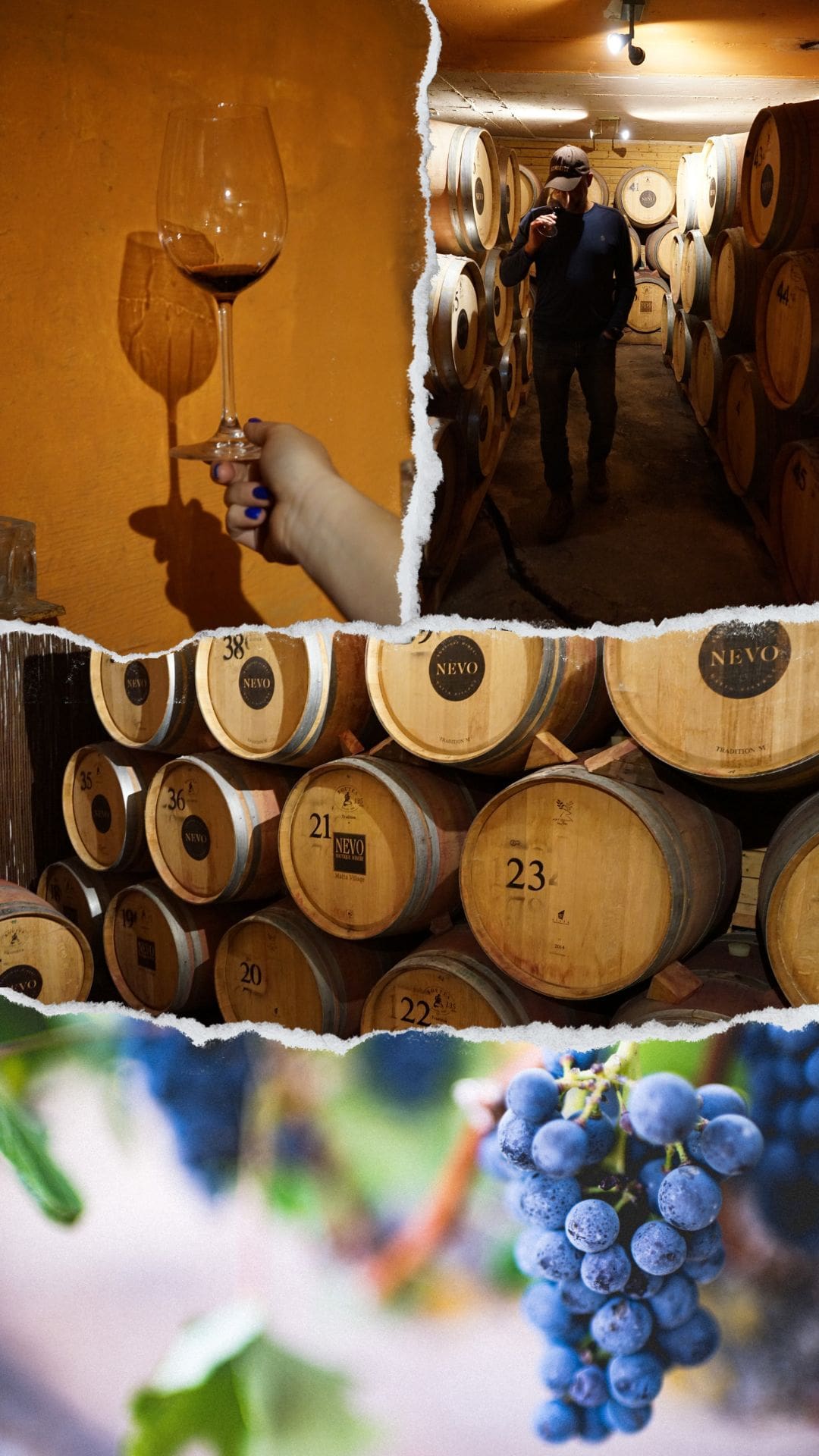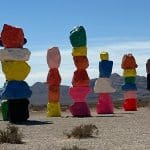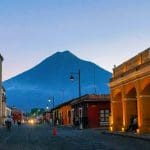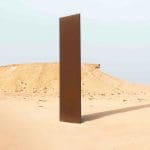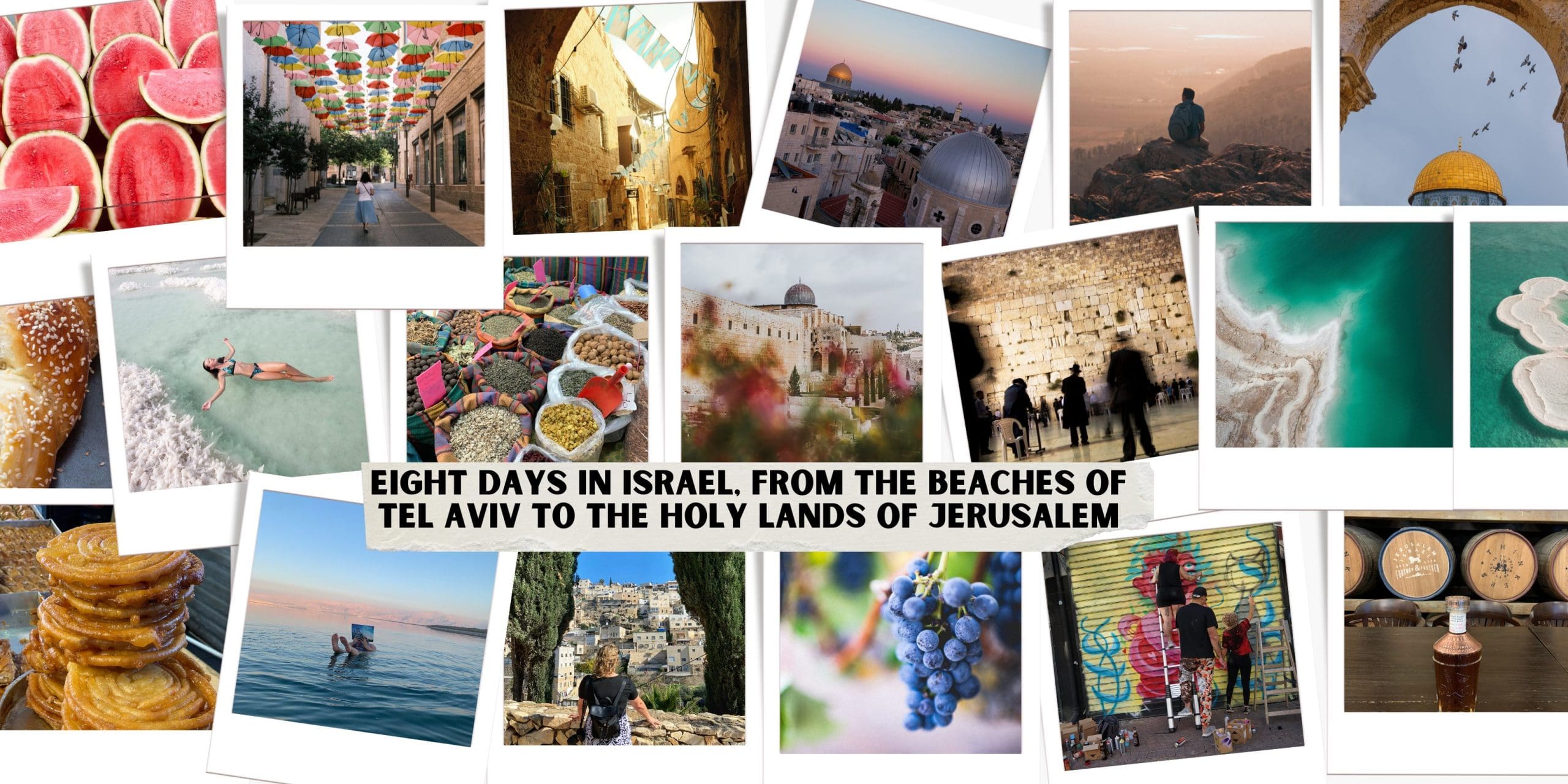
ANN RUPPENSTEIN
The land of creation is establishing itself as a hotspot for culinary experiences and a budding arts and cultural scene
Of all the things I envisioned doing in Israel – from floating in the Dead Sea to visiting the historic Western Wall – one thing I didn’t remotely anticipate was to wind up defacing public property. Yet here I am, feeling like a rebel, with a can of light pink spray paint in my right hand in the back streets of Tel Aviv – in broad daylight to boot.
Let me rewind a bit. This wasn’t my idea. It all started innocently enough under the guise of a graffiti tour through the artsy Florentin neighbourhood. After seeing some impressive pieces and learning about different types of street art such as site-specific murals that incorporate structural elements of a building, like an exterior cable or a pipe into the design, our tour guide and Tel Aviv-based musician, Maor Abitbul, opened his backpack and proceeded to pass out cans of spray paint. “Now it’s your turn,” he says.
One by one, everyone on the tour quite literally started leaving their mark on Tel Aviv. Suddenly, our amateur creative process was interrupted by a family who had witnessed our mischief. But rather than stopping us, they asked to borrow a can of spray paint and we watched on as their young daughter stepped up to the wall to continue our masterpiece.
In all honesty, it was a practice wall for artists so no damage or vandalism was done, but looking back on it now, it’s one of the experiences that made my first visit to the country so memorable. Before parting ways with the group, Abitbul showed us a piece he created that displays a lyric from one of his songs under the name JIGI: “You are always welcome.”
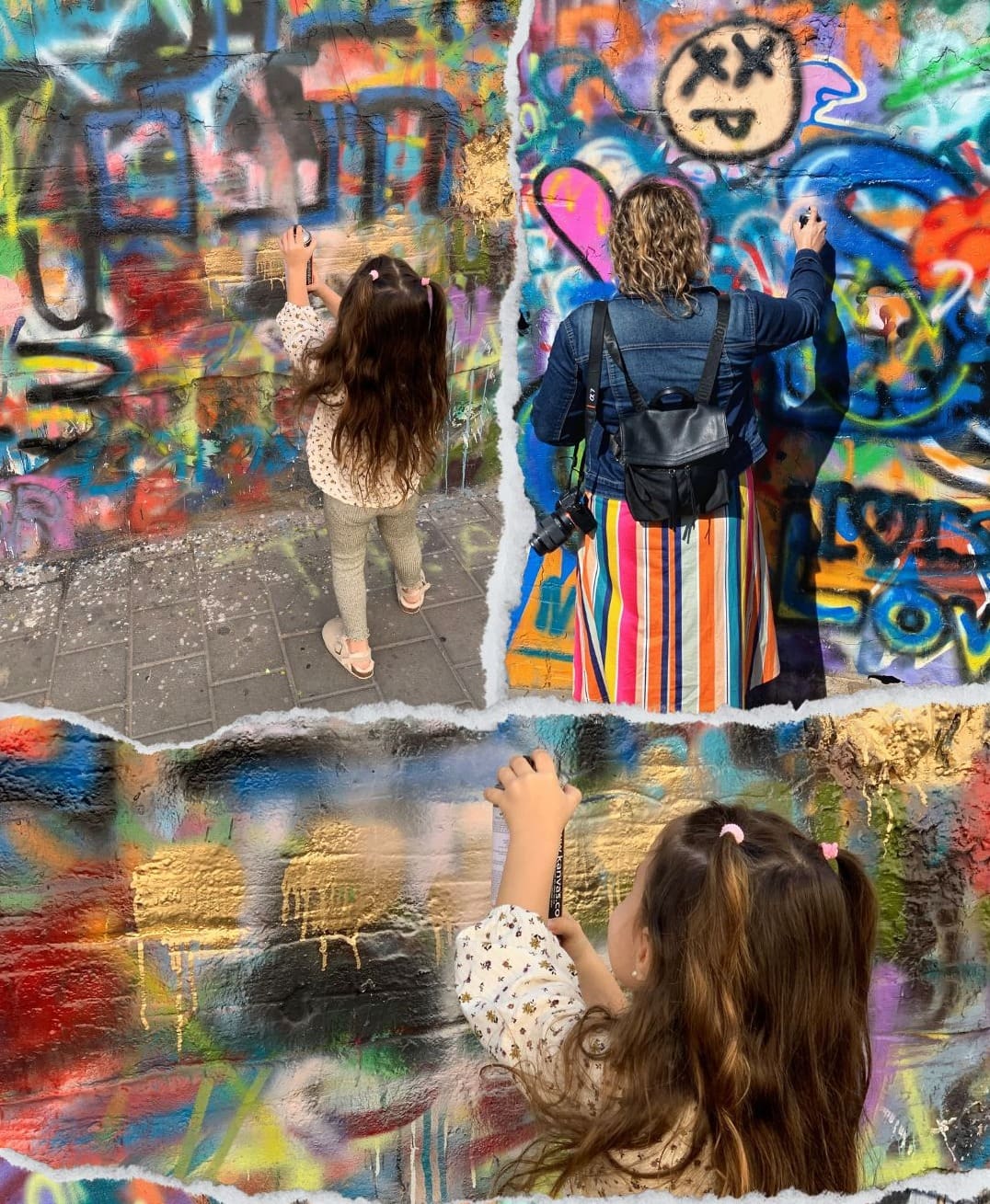
Jerusalem’s modern side
In a destination where old meets new, iconic religious sites like the Church of the Holy Sepulchre —the site where Jesus was said to have been resurrected — are steps away from vibrant markets and lively restaurants.
In Jerusalem, French expat Sophie Rosenbaum is on a mission to show people the city through her eyes — as a hub for culture and creativity. Living in the city since 1991, Rosenbaum now offers curated fashion, lifestyle and cultural themed tours. “It started to get bigger and bigger with more and more tours. Then Israeli tourism asked me to work with people who were coming from abroad to show them Jerusalem the way I see it,” she says, explaining how the venture took off. “It’s about seeing Jerusalem in a different way.”
Rosenbaum says Israel is a unique place to visit because people can step back in time to parts that date back over 7,000 years and then set foot in a modern community eatery, like Nocturno Cafe, which hosts live performances, a menu offering dishes like vegan eggs, and even a kosher sex shop upstairs. Even though Jerusalem is one of the oldest cities in the world, there’s a youthful energy to it, she says, and proceeds to introduce us to fashion designer Anat Friedman. While many of Friedman’s designer colleagues opted to relocate to Tel Aviv, she decided to establish herself in Jerusalem to help grow the local fashion and design scene.
“The municipality decided to open a place to attract young designers to stay in Jerusalem because they knew everyone was moving to Tel Aviv,” she says, adding that subsidized spaces for art and design businesses became available. Another stop is the Machane Yehuda Market, also known as “The Shuk,” which truly comes alive at night. During the day some 250 vendors sell fresh fruits and vegetables, spices and a variety of street food and desserts, but at night it’s a hotspot to hangout. Craft beer fans will want to visit the Beer Bazaar, which offers more than 100 types of Israeli beer.
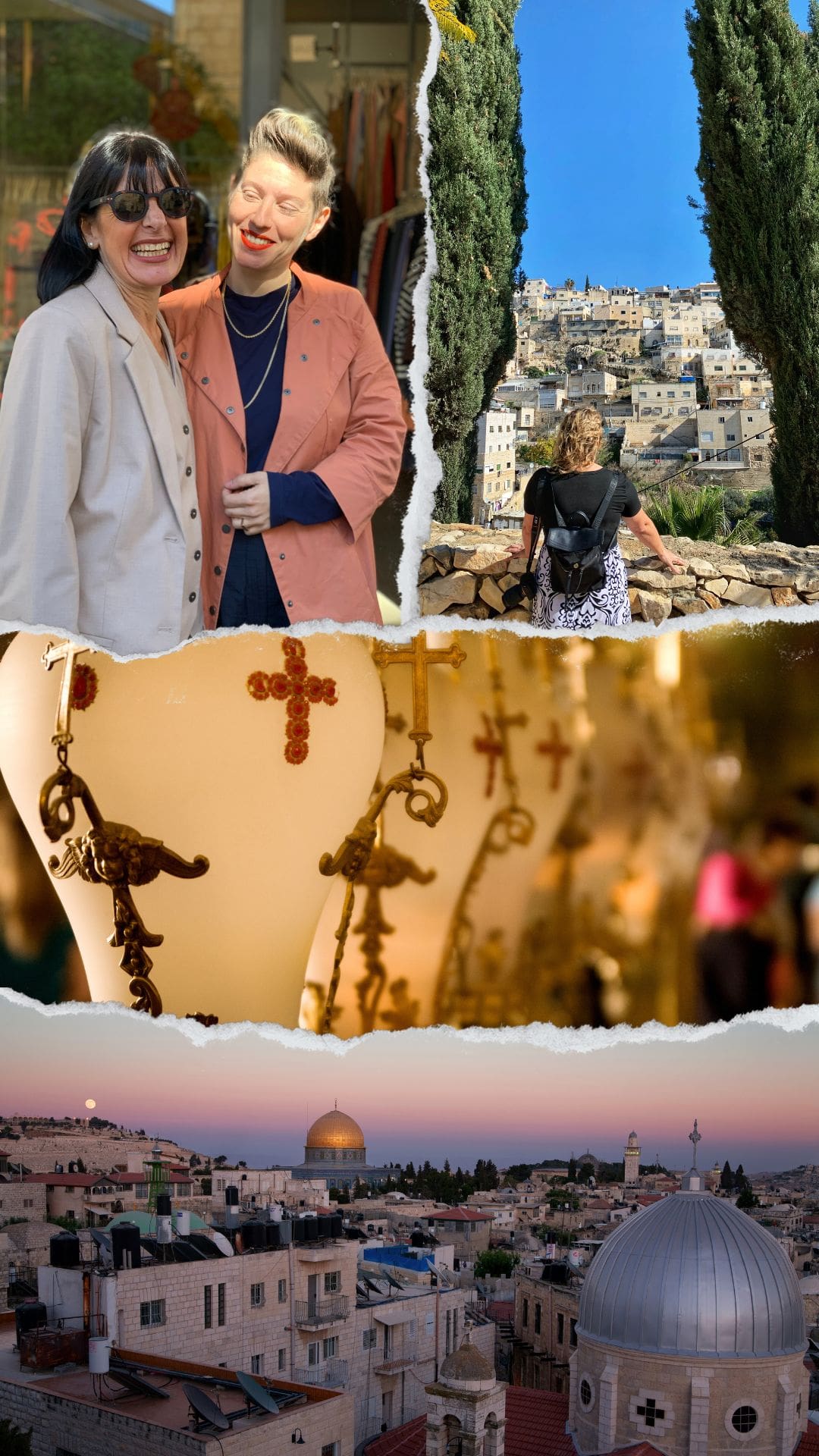
A spirited place
On every bottle at Thinkers Distillery, a label reads ‘‘Who is wise? One who learns from every person’. “It’s a passage from the bible that basically epitomizes the idea of Thinkers. We’re using different advancements and knowledge from different regions into our spirits,” explains Michael Ginosar, vice president of business development for Thinkers Distillery, which is located next to the lively Machane Yehuda Market. Holding up a bottle of their uniquely designed vodka bottles, he adds, “Our vodka bottle really tells our story. It has different inscriptions — some of it has nothing to do with alcohol — like these notes here are Beethoven’s Fifth Symphony. The guy furthered music, he took it to a different level. All of our products say the word ‘furthered’ because we’re always looking to take the best and try to make it better.”
Ginosar says the idea behind Thinkers is to build on Israel’s reputation as a start-up nation and take advantage of advances in science, technology, chemistry and physics to take spirits to the next level. “We incorporate all that into the production process with the goal of making the best possible spirits,” he says. “The aim of this whole company is to make the best possible spirits and start exporting them all over the world.”
For example, although Jerusalem is on the edge of the desert, water—a key ingredient in making spirits—isn’t readily available. As a solution, Thinkers utilizes a high-tech process to create water from “clean pure Jerusalem air.” With 60 per cent of spirits being water, the process is not only an example of innovation and conservation but also impacts the finished taste of the product. “It really gives me control,” he says. “It gives me the purest water I can make. With better control, we can create a better spirit.”
The team refers to the award-winning spirits distillery as “part research library, part chemistry lab, part advanced technology workshop.” Although the distillery was initially set to open right as COVID-19 disrupted the world, the company officially launched in January of 2022 and now has its product in 450 different shops across Israel, and is set to export to the U.S. next quarter. Along with gin and vodka, the distillery just launched Thinkers Dew of B’dolah Israel Finish Bourbon Whiskey, Israel’s first bourbon. In order to classify as true bourbon, the product has to be distilled in the U.S. Knowing that barrelled spirits need constant motion, Ginosar says they select the longest ship route from America to Israel to help the aging process. Notably, many spirits used to be aged this way in the era of pirates.
Today, Thinkers Distillery has a visitor’s centre that’s open for tasting sessions as well as distillery tours. Although they have big ambitions, he says there aren’t many others in their industry in Israel. “Israel has a lot of wineries — and it’s a good place to grow grapes. There are excellent wines coming out of Israel,” he adds. “There’s a brewing industry that’s really grown in the past 10-15 years, you’re seeing a lot of craft breweries, but for spirits, it’s still a really, really small industry.”
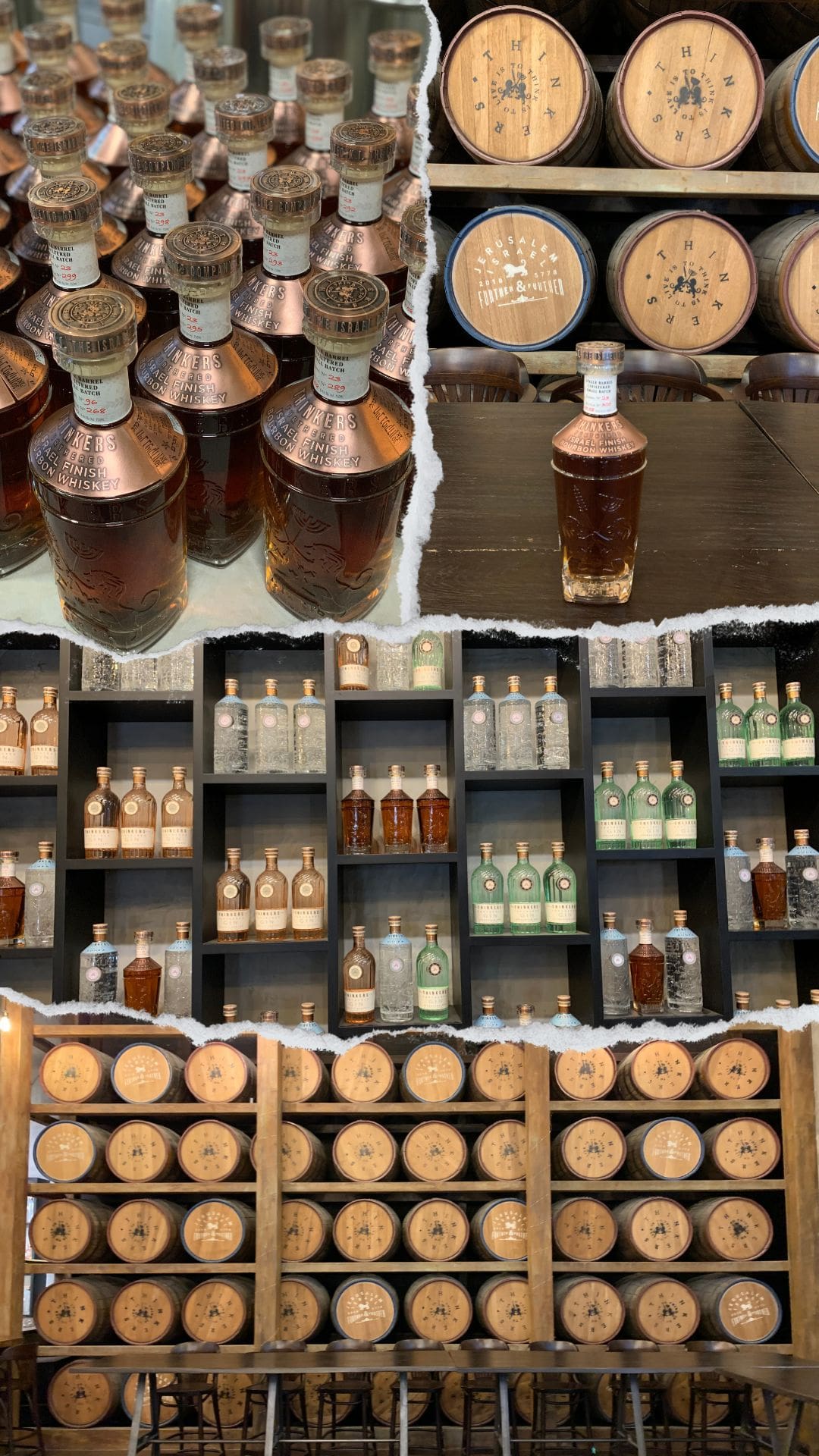
Judean Hills: a blossoming wine region
Over the last two decades, Israel’s wine scene has grown tremendously from a handful of producers to more than “300 boutique wineries,” notes Nevo Winery’s general manager Lior Perl. The winery, which has indoor and outdoor tasting rooms, is located in the Judean Hills, about a half hour from Jerusalem.
Set on the premises of what was previously a kindergarten, she says Nevo Winery has the distinguishing feature of having a wine cellar that’s located in a former bomb shelter. “We produce about 20,000 bottles a year, on a regular year,” Perl explains ahead of a tasting. “Last year, for example, was an abnormal year because it was a sabbatical year. Shmitta in Judaism.”
Based on Jewish belief, the land is neither worked nor sold every seven years. Any grapes that do grow are open for anyone to take. As owner Nevo Hazan doesn’t speak much English, Perl shares the story about how the former delivery driver wound up in the business of making wine. After a life-changing terrorist encounter, Hazan decided to relocate his family to the slower paced Mata village where he grew up. While his aunt came to live with him during chemotherapy treatments, she showed his children how to handpick the grapes that were growing naturally in the area and they started making small batches of homemade wine. By the time his aunt left one year later cancer-free, he was drawn to being a winemaker.
“He decided, that’s what he wanted to do with his life,” she shares, adding that he went on to enroll in a government-sponsored winemaking course on a kibbutz before taking specialized courses in France, Spain and Italy. To this day, the grapes are harvested by hand. When people come to the winery and ask, “Who runs this place?” Hazan will point to the sky and say, “I just work here.”
